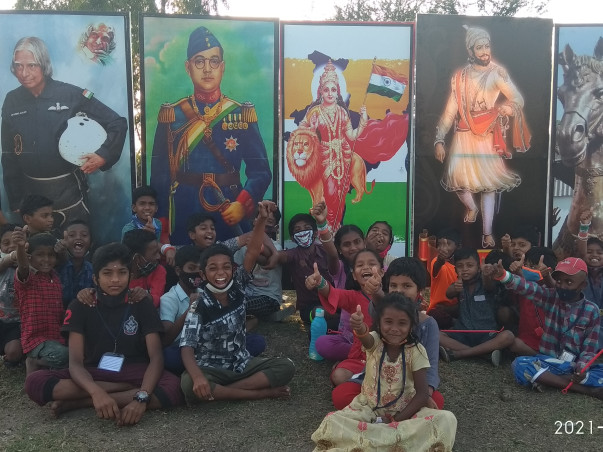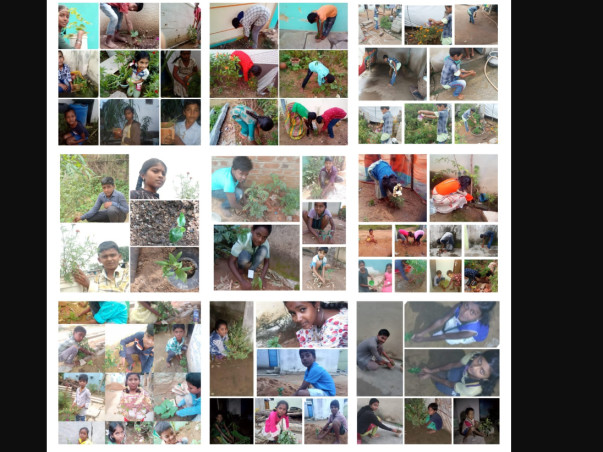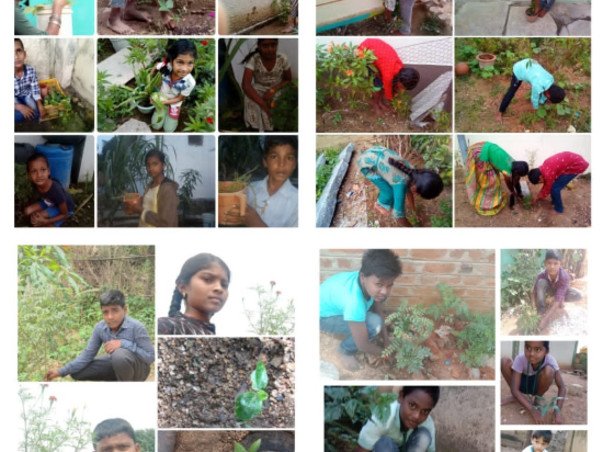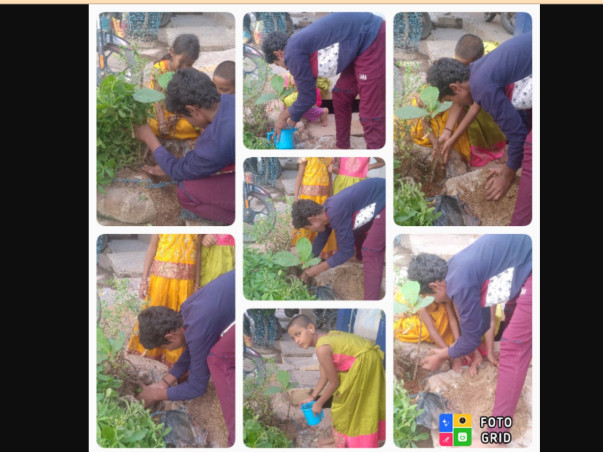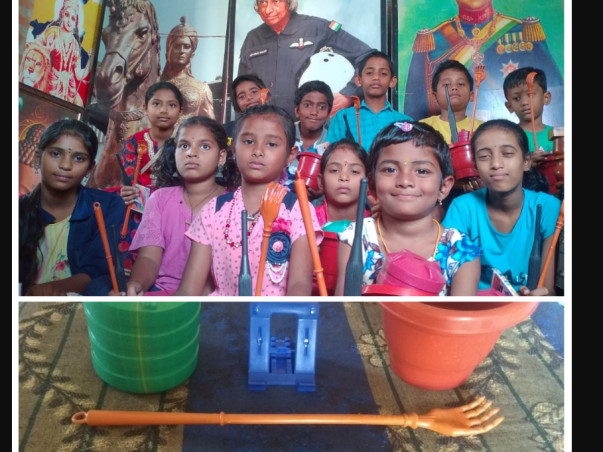The Project - Gurukulam 360° Learning School
Issue
“It’s not HOW smart you are. It’s how YOU are smart” - Howard Gardner. Typically children are considered “Intelligent and smart” only if they perform well in studies and are good with reading, writing and mathematics. Howard Gardner has brought a whole new way to our understanding of intelligence and nurturing potential. The way is path-breaking and has many implications for parents and schools. It states that "different people are not more or less intelligent, rather they are intelligent differently and in multiple ways (not only with reading writing and maths"; that intelligence is the ability to solve problems and create products and needs to be assessed “on the job”.
Every child is different with a unique profile and a combination of intelligence. They indicate what the child would enjoy doing and be good at, naturally. The profile also indicates how the child processes information, and learns best. However, intelligence need opportunities to develop further and for the child to realize his potential!
According to Psychology, kids Span of Attention is almost equal to their age and they will get distracted easily if any learning activity goes beyond a couple of minutes and it will take more time to bring back their focus and attention.
Also, the current educational system focused majorly on syllabus oriented activities which is helping them to improve their basic learning skills such as Listening, Speaking, Reading and Writing along with Arithmetic Skills.
There is very less scope to improve their Multiple Intelligences such as
· Linguistic Intelligence - the intelligence of writers and poets
a. Sensitive to Words, Grammar, Sound & Rhythm, Can convey information effectively. Explain & enthuse others effectively through the use of language.
· Musical Intelligence - the intelligence of composers
a. Sensitive to Pitch, Rhythm and Timeline in music
· Logical Mathematical Intelligence - the intelligence of scientists and mathematicians
a. Sorting & ordering (in different categories). Understand statements, propositions, functions & complex propositions. Capable of making related abstractions
· Spatial Intelligence - the intelligence of artists and architects.
a. Recognizing an object, picture, line or graphic from different angles & views (i.e. a plane seen from above, below, from the side). Ability to conjure up imagery & graphic likeness of different views of the same objects, line or symbol*s*
· Bodily Kinesthetic Intelligence - the intelligence of dancers, sportsmen, and gymnasts
a. Control of body movements and ability to handle objects skillfully
· Interpersonal Intelligence - the intelligence of statesmen and social activists
a. Empathy, social skills and ability to discriminate between many personal cues. Prioritize intensity and Respond effectively to cues. Inspire people to positive actions & tide over negative emotions
· Intrapersonal Intelligence - the intelligence of philosophers
a. Displays Self control, discipline zeal, self motivation and persistence against odds.
· Naturalist Intelligence - the intelligence of environmentalists
a. Identify, distinguish & classify the categories of paints & animals & work with them
Action
A gurukula or gurukulam (Sanskrit: गुरुकुल, romanized: gurukula) was a type of education system in ancient India with shishya ('students' or 'disciples') living near or with the guru, in the same house. The guru-shishya tradition is a sacred one in Hinduism and appears in other religious groups in India, such as Jainism, Buddhism and Sikhism. The word gurukula is a combination of the Sanskrit words guru ('teacher' or 'master') and kula ('family' or 'home'). Before the arrival of the British, they served as South Asia's primary educational system. The term is also used today to refer to residential monasteries or schools operated by modern gurus. The proper plural of the term is gurukulam, though gurukulas and gurukuls are also used in English and some other Western languages.
Gurukulam 360° Learning School: Similar to Gurukulam model, in this 21st Century, imparting essential skills and values are essential through Multiple Intelligences using experiential learning methodology. At our Gurukulam, various games and activities are used to impart the skills daily, morning and evening.
Daily Gurukulam Activities
· Daily Morning Activities between 6 AM to 8 AM
1. Morning Prayer to improve musical intelligence
2. Meditation to improve intrapersonal intelligence
3. OM Chanting to improve musical intelligence
4. Pranayamam (Breathing Exercise) to improve intrapersonal intelligence
5. Fast Breathing to improve intrapersonal intelligence
6. EYE Exercise to improve Bodily Kinesthetic intelligence
7. Super Brain Yoga to improve Bodily Kinesthetic Intelligence
8. Lazy 8 to improve Bodily Kinesthetic Intelligence
9. Cross Cawl to improve Bodily Kinesthetic Intelligence
10. Back Claps to improve Bodily Kinesthetic Intelligence
11. Bending Dance to improve Bodily Kinesthetic Intelligence
12. Stretching Exercise to improve Bodily Kinesthetic Intelligence
13. Acupressure Body Message to improve Bodily Kinesthetic Intelligence
14. Baton Pass to improve Bodily Kinesthetic Intelligence
15. Tangram Puzzle learning & practice to improve spatial intelligence
16. EYE Test to improve spatial intelligence through Tab as ICT (Informational Communication Tool)
17. Lumosity Brain Training to improve Linguistic and Logical intelligences through Tab as ICT (Informational Communication Tool)
18. WFP Freerice to improve interpersonal intelligence through Tab as ICT (Informational Communication Tool)
19. Badminton Coaching to improve Bodily Kinesthetic Intelligence
· Evening Activities between 5 PM to 7 PM
1. Freerice, Eye Test and Lumosity apps in Lenovo Tab as ICT (Informational Communication Tool) to improve interpersonal intelligence
2. Metal Puzzles to improve Logical Mathematical Intelligence
3. Rubik’s Cube to improve Spatial Intelligence
4. Bean bag pass to improve Spatial Intelligence
5. Middle Monkey to improve Bodily Kinesthetic Intelligence
6. OTP (Observe Think Play) to share the visual perceptions of a picture to improve Interpersonal Intelligence
7. WOW (Wonders of Words) to build sentences using a word to improve Linguistic Intelligence
8. Moral Claps to improve Bodily Kinesthetic Intelligence
9. Songs, Rhymes with Dance to improve Musical Intelligence
10. Smart Reading to improve Linguistic Intelligence
11. Smart Writing to improve Linguistic Intelligence
12. Daily Routine Sharing in a Pair to improve Linguistic Intelligence
13. Walk n Talk English Word Games to improve Linguistic Intelligence
14. Walk n Talk Mental Maths Games to improve Logical Mathematical Intelligence
15. Visual, Auditory & Blindfold touch letter recognition to improve Linguistic Intelligence
16. Fish Kit Games to improve Bodily Kinesthetic Intelligence
17. Pratham Books Reading sessions to improve Linguistic Intelligence
18. Mentoring Program to connect each Gurukulam Learner with a Volunteer to mentor them over phone daily for 30 Mins
· Weekend Activities
1. Chess Coaching to improve Spatial Intelligence
2. Bhagvadgeetha Sloka Parayana to improve Musical Intelligence
3. ECO (Environmental Conservation Outing) Tour to improve Naturalist Intelligence
4. SmilExpress to Old Age and Children’s Home for their wellbeingness to improve Interpersonal Skills
5. Impact Walk to support various causes through Impact app to improve Interpersonal Skills
Impact
The collected funds will be transferred directly to each student or parent's account.
Issue
“It’s not HOW smart you are. It’s how YOU are smart” - Howard Gardner. Typically children are considered “Intelligent and smart” only if they perform well in studies and are good with reading, writing and mathematics. Howard Gardner has brought a whole new way to our understanding of intelligence and nurturing potential. The way is path-breaking and has many implications for parents and schools. It states that "different people are not more or less intelligent, rather they are intelligent differently and in multiple ways (not only with reading writing and maths"; that intelligence is the ability to solve problems and create products and needs to be assessed “on the job”.
Every child is different with a unique profile and a combination of intelligence. They indicate what the child would enjoy doing and be good at, naturally. The profile also indicates how the child processes information, and learns best. However, intelligence need opportunities to develop further and for the child to realize his potential!
According to Psychology, kids Span of Attention is almost equal to their age and they will get distracted easily if any learning activity goes beyond a couple of minutes and it will take more time to bring back their focus and attention.
Also, the current educational system focused majorly on syllabus oriented activities which is helping them to improve their basic learning skills such as Listening, Speaking, Reading and Writing along with Arithmetic Skills.
There is very less scope to improve their Multiple Intelligences such as
· Linguistic Intelligence - the intelligence of writers and poets
a. Sensitive to Words, Grammar, Sound & Rhythm, Can convey information effectively. Explain & enthuse others effectively through the use of language.
· Musical Intelligence - the intelligence of composers
a. Sensitive to Pitch, Rhythm and Timeline in music
· Logical Mathematical Intelligence - the intelligence of scientists and mathematicians
a. Sorting & ordering (in different categories). Understand statements, propositions, functions & complex propositions. Capable of making related abstractions
· Spatial Intelligence - the intelligence of artists and architects.
a. Recognizing an object, picture, line or graphic from different angles & views (i.e. a plane seen from above, below, from the side). Ability to conjure up imagery & graphic likeness of different views of the same objects, line or symbol*s*
· Bodily Kinesthetic Intelligence - the intelligence of dancers, sportsmen, and gymnasts
a. Control of body movements and ability to handle objects skillfully
· Interpersonal Intelligence - the intelligence of statesmen and social activists
a. Empathy, social skills and ability to discriminate between many personal cues. Prioritize intensity and Respond effectively to cues. Inspire people to positive actions & tide over negative emotions
· Intrapersonal Intelligence - the intelligence of philosophers
a. Displays Self control, discipline zeal, self motivation and persistence against odds.
· Naturalist Intelligence - the intelligence of environmentalists
a. Identify, distinguish & classify the categories of paints & animals & work with them
Action
A gurukula or gurukulam (Sanskrit: गुरुकुल, romanized: gurukula) was a type of education system in ancient India with shishya ('students' or 'disciples') living near or with the guru, in the same house. The guru-shishya tradition is a sacred one in Hinduism and appears in other religious groups in India, such as Jainism, Buddhism and Sikhism. The word gurukula is a combination of the Sanskrit words guru ('teacher' or 'master') and kula ('family' or 'home'). Before the arrival of the British, they served as South Asia's primary educational system. The term is also used today to refer to residential monasteries or schools operated by modern gurus. The proper plural of the term is gurukulam, though gurukulas and gurukuls are also used in English and some other Western languages.
Gurukulam 360° Learning School: Similar to Gurukulam model, in this 21st Century, imparting essential skills and values are essential through Multiple Intelligences using experiential learning methodology. At our Gurukulam, various games and activities are used to impart the skills daily, morning and evening.
Daily Gurukulam Activities
· Daily Morning Activities between 6 AM to 8 AM
1. Morning Prayer to improve musical intelligence
2. Meditation to improve intrapersonal intelligence
3. OM Chanting to improve musical intelligence
4. Pranayamam (Breathing Exercise) to improve intrapersonal intelligence
5. Fast Breathing to improve intrapersonal intelligence
6. EYE Exercise to improve Bodily Kinesthetic intelligence
7. Super Brain Yoga to improve Bodily Kinesthetic Intelligence
8. Lazy 8 to improve Bodily Kinesthetic Intelligence
9. Cross Cawl to improve Bodily Kinesthetic Intelligence
10. Back Claps to improve Bodily Kinesthetic Intelligence
11. Bending Dance to improve Bodily Kinesthetic Intelligence
12. Stretching Exercise to improve Bodily Kinesthetic Intelligence
13. Acupressure Body Message to improve Bodily Kinesthetic Intelligence
14. Baton Pass to improve Bodily Kinesthetic Intelligence
15. Tangram Puzzle learning & practice to improve spatial intelligence
16. EYE Test to improve spatial intelligence through Tab as ICT (Informational Communication Tool)
17. Lumosity Brain Training to improve Linguistic and Logical intelligences through Tab as ICT (Informational Communication Tool)
18. WFP Freerice to improve interpersonal intelligence through Tab as ICT (Informational Communication Tool)
19. Badminton Coaching to improve Bodily Kinesthetic Intelligence
· Evening Activities between 5 PM to 7 PM
1. Freerice, Eye Test and Lumosity apps in Lenovo Tab as ICT (Informational Communication Tool) to improve interpersonal intelligence
2. Metal Puzzles to improve Logical Mathematical Intelligence
3. Rubik’s Cube to improve Spatial Intelligence
4. Bean bag pass to improve Spatial Intelligence
5. Middle Monkey to improve Bodily Kinesthetic Intelligence
6. OTP (Observe Think Play) to share the visual perceptions of a picture to improve Interpersonal Intelligence
7. WOW (Wonders of Words) to build sentences using a word to improve Linguistic Intelligence
8. Moral Claps to improve Bodily Kinesthetic Intelligence
9. Songs, Rhymes with Dance to improve Musical Intelligence
10. Smart Reading to improve Linguistic Intelligence
11. Smart Writing to improve Linguistic Intelligence
12. Daily Routine Sharing in a Pair to improve Linguistic Intelligence
13. Walk n Talk English Word Games to improve Linguistic Intelligence
14. Walk n Talk Mental Maths Games to improve Logical Mathematical Intelligence
15. Visual, Auditory & Blindfold touch letter recognition to improve Linguistic Intelligence
16. Fish Kit Games to improve Bodily Kinesthetic Intelligence
17. Pratham Books Reading sessions to improve Linguistic Intelligence
18. Mentoring Program to connect each Gurukulam Learner with a Volunteer to mentor them over phone daily for 30 Mins
· Weekend Activities
1. Chess Coaching to improve Spatial Intelligence
2. Bhagvadgeetha Sloka Parayana to improve Musical Intelligence
3. ECO (Environmental Conservation Outing) Tour to improve Naturalist Intelligence
4. SmilExpress to Old Age and Children’s Home for their wellbeingness to improve Interpersonal Skills
5. Impact Walk to support various causes through Impact app to improve Interpersonal Skills
Impact
- Students who used to sit on the streets and play PUBG games are now with Gurukulam to spend their quality time after school.
- Students who create nonsense in streets are learning skills through games at Gurukulam
- Students weekends become service days with various volunteering activities
- Students spending their vacations with new assignments to sharpen their skills
- Gurukulam Learners become first ever volunteers who do Random acts of kindness in and around the region.
- We created International Puppetry Trainers from our Gurukulam
- We created Rubiks Cube Champions who can solve puzzle in a minute
- We are providing employability to the rural unemployed youth as a coach with international training and making the graduates from the village to create Champions through Gurukulam
The collected funds will be transferred directly to each student or parent's account.
